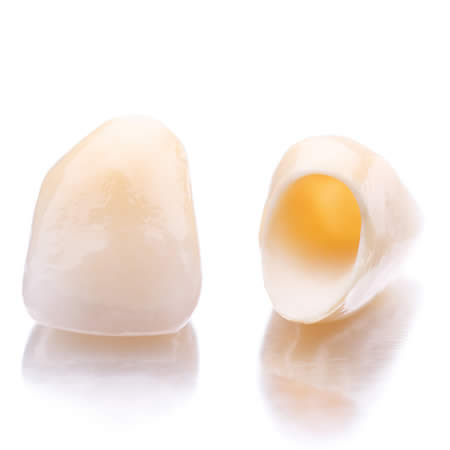Restorative Treatments
Smile with confidence
Crowns And Bridges
Both crowns and most bridges are permanently fixed in the mouth by being cemented onto existing teeth or implants, and can only be removed by a dentist.
While crowns and bridges can last a lifetime, they do sometimes come loose or fall out. The most important step you can take to ensure the longevity of your crown or bridge is to practice good oral hygiene. A bridge can lose its support if the teeth or bone holding it in place are damaged by dental disease. Keep your gums and teeth healthy by brushing with fluoride toothpaste twice a day and flossing daily. Also see your dentist and hygienist regularly for check-ups and professional cleaning.
Crowns
A crown is used to entirely cover or “cap” a damaged tooth. Besides strengthening a damaged tooth, a crown can be used to improve its appearance, shape or alignment. A crown can also be placed on top of an implant to provide a tooth-like shape and structure for function.
Most crowns are made of either ceramic or a combination of ceramic and metal depending on your preferences and the advice of the dentist.


Bridges
A bridge may be recommended if you’re missing one or more teeth. Gaps left by missing teeth eventually cause the remaining teeth to rotate or shift into the empty spaces, resulting in a bad bite. The imbalance caused by missing teeth can also lead to gum disease and temporomandibular joint (TMJ) disorders.
Bridges are commonly used to replace one or more missing teeth. They span the space where the teeth are missing. Bridges are cemented to the natural teeth or implants surrounding the empty space. These teeth, called abutments, serve as anchors for the bridge. A replacement tooth, called a pontic, is attached to the crowns that cover the abutments. As with crowns, you have a choice of materials for bridges. Your dentist can help you decide which to use, based on the location of the missing tooth (or teeth), its function, aesthetic considerations and cost. Porcelain or ceramic bridges can be matched to the colour of your natural teeth.

Root Canal treatment
Sometime before a filling, crown or bridge can be placed, root canal treatment, also known as endodontics, is required. This is needed when the pulp tissues in the tooth have become infected or inflamed.
Treatment involves the removal of the infected pulp tissues from the tooth and is the first step in saving the tooth. Debris within the canals is removed by flushing with an anti-bacterial solution before the canals are finally filled or sealed and the tooth restored to full shape and function by either a permanent filling or a crown.
dental Implants
Implant therapy is a well-proven, state-of-the-art dental technique, which has been scientifically tested and used in the last three decades by qualified dentists and surgeons worldwide.
Dental implants are an artificial root that works like a natural one when a tooth and its root are missing, coupled with a crown on the dental implant that works like a natural tooth.
A dental implant is a very small but strong post made of biocompatible metals which is inserted into the jaw bone in place of the missing tooth root. Such an implant acts as a support for the tooth, and is surgically inserted under local anaesthetic on an outpatient basis. Until the implant is securely attached to the jaw bone (a process called “osseointegration”), a healing phase of between 6 weeks and a few months is necessary, depending on the individual medical situation.
Once the implant has completed integration the final restoration can be created in a variety of materials, including natural looking ceramic materials.

Your dentist can discuss with you if implants are a suitable treatment option and depending on the level of treatment required you may be referred to a specialist practice. If you are based in Finchampstead, Wokingham or the surrounding areas and are looking for the latest solution for replacing missing teeth, please get in touch with our experienced team.

